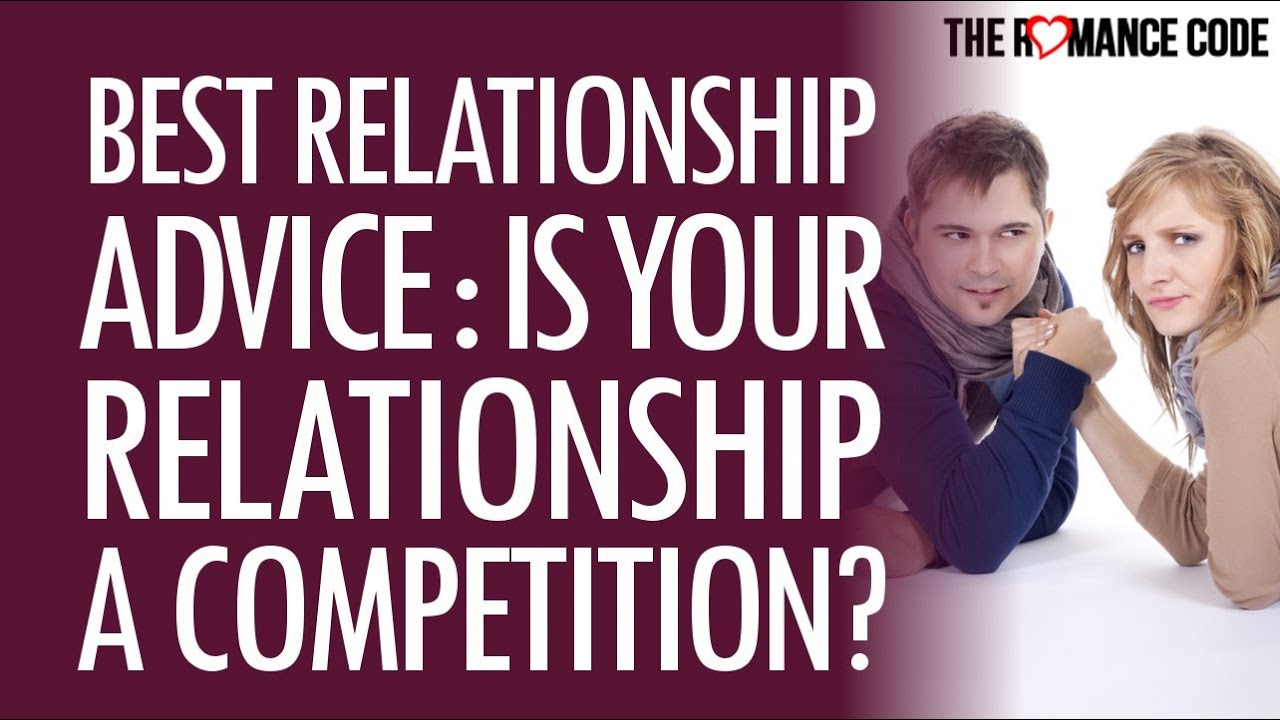
In relationships, it’s not uncommon to sometimes feel like you’re in a never-ending competition with your partner. You may find yourself comparing your accomplishments, constantly seeking validation, or even feeling a tinge of envy when they achieve something great. But why does this feeling persist? This article explores the possible reasons behind this phenomenon and offers insights into how you can navigate this dynamic to build a healthier and more supportive relationship with your partner.
Understanding the Concept of Competition in Relationships
Competition is a natural aspect of human relationships, and it can manifest itself in various ways. While competition is commonly associated with sports or professional environments, it also plays a significant role in interpersonal relationships. Understanding the concept of competition in relationships is crucial for maintaining a healthy and fulfilling partnership. In this article, we will explore the importance of healthy competition, the different types of competition in relationships, and the potential consequences it can have.
Importance of healthy competition
Healthy competition can have several positive effects on romantic relationships. It can motivate both individuals to improve themselves and strive for personal growth. When partners engage in healthy competition, they can push each other to achieve their goals, leading to a sense of accomplishment and fulfillment. Moreover, competition can strengthen the bond between partners by creating shared experiences and fostering a spirit of camaraderie. By challenging each other and supporting one another, couples can cultivate a supportive and growth-oriented environment.
Different types of competition in relationships
Competition in relationships can take various forms, and understanding these types is essential for navigating potential challenges. One common type is competitive goal-setting, where partners establish personal goals and engage in friendly rivalry to achieve them. This type of competition can be healthy if it is based on mutual support and encouragement rather than trying to outdo one another. Another type of competition is social comparison, where individuals compare themselves and their relationship to others. This type of competition can be detrimental if it leads to feelings of inadequacy or dissatisfaction.
Potential consequences of competition in relationships
While competition can be healthy and motivating, it can also have negative consequences if not properly managed. Excessive competition can create a toxic environment, leading to feelings of jealousy, resentment, and insecurity. It can strain the bond between partners and erode trust and intimacy. Moreover, constant competition can shift the focus away from the relationship itself and onto individual achievements, potentially causing feelings of isolation and disconnection. It is crucial to strike a balance between healthy competition and maintaining a strong and united partnership.
Factors Influencing Perceived Competition with Partner
Various factors can contribute to the perception of competition with a partner. Understanding these factors can help individuals navigate their feelings and improve the dynamics of their relationship.
Insecurity and self-esteem
Feelings of insecurity and low self-esteem can significantly impact the way individuals perceive competition with their partner. When individuals lack self-confidence, they may feel threatened by their partner’s achievements or compare themselves unfavorably. Moreover, individuals with insecurities may interpret their partner’s accomplishments as a reflection of their own inadequacy. Building self-esteem and addressing personal insecurities can help mitigate these feelings of competition.
Comparison with others
The influence of external factors, such as social comparison, can contribute to the perception of competition within a relationship. With the advent of social media, individuals are constantly exposed to curated images of seemingly perfect relationships, leading to feelings of self-doubt and competition. It is important to remind yourself that social media often portrays an idealized version of reality and that comparing your relationship to others can be detrimental to your own happiness. Focusing on your unique journey and nurturing your relationship rather than seeking outside validation is key.
Previous relationship experiences
Past relationship experiences can also shape how individuals perceive competition with their current partner. If one has been in a toxic or competitive relationship before, it is natural to be wary and sensitive to any signs of competition in a new relationship. Being aware of how past experiences might influence present dynamics can help individuals address any lingering insecurities or trust issues and foster a healthier relationship.

This image is property of i.ytimg.com.
Communication Patterns and Competition
Effective communication is vital in any relationship, and it plays an integral role in managing competition. When communication is lacking, competition can escalate and create unnecessary tension and misunderstandings.
Lack of effective communication
When partners struggle to communicate openly and honestly, it can be challenging to address feelings of competition constructively. Misunderstandings may arise, and assumptions can be made, leading to unnecessary conflict and resentment. By fostering a safe and open environment for dialogue, partners can express their concerns and work collaboratively to address any competition within the relationship.
Unresolved conflict and competition
Competition can exacerbate any existing unresolved conflicts within a relationship. When unresolved conflicts linger, they can contribute to a competitive atmosphere, as partners may feel the need to prove themselves or win arguments. It is crucial to address conflicts promptly and find mutually satisfying resolutions to minimize competition and promote a harmonious relationship.
Negative communication patterns reinforcing competition
Negative communication patterns, such as criticism, defensiveness, contempt, and stonewalling, can reinforce competition within a relationship. When partners engage in these harmful communication patterns, it becomes difficult to address competition constructively. It is essential to identify and replace negative communication patterns with healthy and constructive alternatives to foster a supportive and collaborative environment.
The Role of Social Media in Perceived Competition
In today’s digital age, social media plays an influential role in how individuals perceive competition within relationships. Understanding the impact of social media and managing its influence is crucial for maintaining a healthy relationship.
Comparison through social media
Social media platforms provide a constant stream of carefully curated images and updates from others’ lives, including their relationships. It is easy to fall into the trap of comparing your relationship to the seemingly perfect ones portrayed online. However, it is important to remember that social media only shows a fraction of reality. Focusing on your own relationship and valuing its unique qualities can help mitigate the negative effects of comparison.
Influence of idealized relationships online
Social media often perpetuates an idealized image of relationships, with couples showcasing their happiest moments and milestones. This portrayal can create unrealistic expectations and amplify feelings of competition. However, it is essential to remember that every relationship has its challenges and ups and downs. Being realistic and accepting the imperfections of your own relationship can alleviate the pressure of constant competition.
Impacts of social media on self-esteem and relationship
The constant exposure to filtered and edited versions of other relationships on social media can negatively impact self-esteem and relationship satisfaction. Individuals may question their worth and the quality of their relationship when comparing themselves to the highlight reels of others. Limiting social media consumption and focusing on meaningful offline interactions can help preserve self-esteem and promote a healthier perspective on competition within relationships.
This image is property of qph.cf2.quoracdn.net.
Addressing the Issue: Strategies to Manage Competition in Relationships
Addressing competition within relationships requires proactive efforts and a commitment to personal growth. The following strategies can help individuals manage competition and foster healthier dynamics.
Developing self-awareness and self-esteem
Cultivating self-awareness is a crucial step in managing competition within relationships. By understanding your own insecurities, strengths, and triggers, you can better navigate feelings of competition and communicate them effectively to your partner. Building self-esteem is also essential, as a strong sense of self-worth can mitigate the need to compete with your partner.
Open and honest communication
Establishing open and honest communication channels is vital in managing competition. Partners should create a safe space where they can express their concerns, fears, and insecurities without judgment. By openly discussing feelings of competition, partners can support each other and find collaborative solutions.
Encouraging teamwork and collaboration
Shifting the focus from competition to teamwork and collaboration fosters a healthier dynamic within relationships. Emphasizing shared goals, supporting each other’s achievements, and celebrating mutual accomplishments can create a supportive environment that encourages growth and unity.
Seeking Professional Help
In some cases, managing competition in relationships may require professional intervention. Therapists or counselors can provide guidance, support, and strategies tailored to specific needs.
When to consider therapy or counseling
Individuals should consider seeking therapy or counseling when competition within a relationship becomes overwhelming, detrimental, or impossible to resolve on their own. If feelings of competition persist despite personal efforts and the strategies mentioned earlier, professional help can offer valuable insights and tools for managing and transforming the dynamic.
Benefiting from couples counseling
Couples counseling can provide a safe and non-judgmental space for partners to explore and address competition within their relationship. A qualified therapist can help individuals and couples develop effective communication skills, manage conflict, build self-esteem, and redefine the meaning of success within their partnership.

This image is property of cdn.powerofpositivity.com.
Conclusion
Competition is an intrinsic aspect of human relationships, and understanding how it manifests in partnerships is vital for maintaining a healthy and fulfilling connection. By recognizing the importance of healthy competition, understanding the factors that contribute to perceived competition, addressing communication patterns, and managing the influence of social media, individuals can navigate competition within their relationships more effectively. Through open communication, fostering teamwork, and seeking professional help when needed, partners can build a resilient and thriving partnership that emphasizes growth, support, and collaboration over competition.






